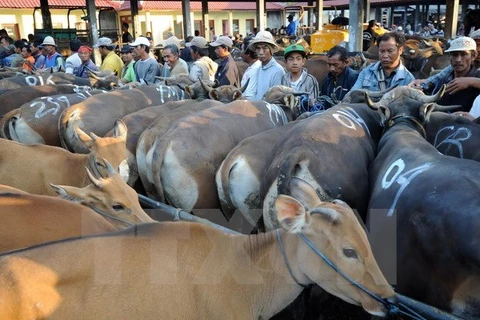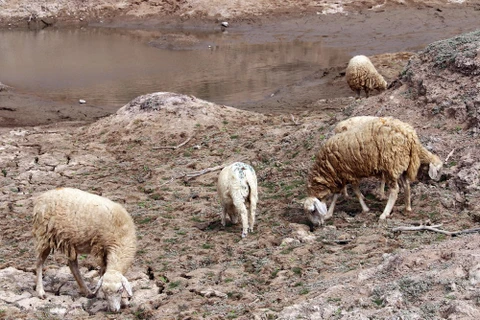HCM City (VNS/VNA) – The south-central province of Ninh Thuan, the country’s largest animal producer, is strengthening measures to breed more sheep, goats, pigs and other animals for commercial production.
The province has more than 160,000 sheep and 137,900 goats, ranking first in the country as a sheep producer and eighth in goat production, according to the province’s Department of Agriculture and Rural Development.
The province has more than 112,000 oxen and cows, 3,800 buffalos and 92,000 pigs.
In Ninh Thuan, which has the least rainfall in the country, farmers mostly breed animals outdoors and on a small scale.
Development projects have taken up land that was once used for outdoor rearing areas for sheep and goats.
Climate change has also caused a decline in quality of natural grass fields and water resources for animals, affecting their yield and quality.
To expand the local breeding industry, Ninh Thuan has provided soft loans for farmers to plant grass fields and invest in clean water provision for animals.
Local authorities have helped rice farmers switch to growing grasses for animals in areas that often lack irrigation water and plant only one rice crop a year.
In the first five months of the year, farmers have so far planted more than 1,200ha of grasses with a total output of 163,000 tonnes, meeting 31 percent of food for the province’s animals, according to the Department of Agriculture and Rural Development.
The province’s Agriculture Extension Centre has provided advanced rearing techniques for animal farmers, including sterilising barns monthly and providing periodic baths for animals.
Phan Quang Thuu, deputy director of the Department of Agriculture and Rural Development, said the province was enhancing cooperation among farmers, scientists, local authorities and companies to create value chains for breeding animals.
The province had developed cooperatives to create stronger links between farmers and companies, Thuu said.
According to Pham Minh Quang, director of the Tan Ha Cooperative in Thuan Nam district’s Nhi Ha commune, his cooperative has applied advanced techniques in building animal barns, choosing animal strains and breeding techniques, and treating animal diseases.
With the decline of natural grass fields, the co-operative has switched from feeding sheep on grass fields to indoor rearing, which has helped to reduce risks and disease, making the sheep grow faster.
The cooperative has invested in planting more than 1 ha of grass which has an output of 700 kilos a day that feeds the cooperative’s sheep.
The co-operative sells about 100 male sheep every three months, while each sheep weighs about 30 kilos.
The cooperative earns revenue of 1 billion VND (43,000 USD) a year.
Under a provincial People’s Committee plan, Ninh Thuan targets having a total of 190,000 sheep, including 45,000 females, by 2020.-VNS/VNA
The province has more than 160,000 sheep and 137,900 goats, ranking first in the country as a sheep producer and eighth in goat production, according to the province’s Department of Agriculture and Rural Development.
The province has more than 112,000 oxen and cows, 3,800 buffalos and 92,000 pigs.
In Ninh Thuan, which has the least rainfall in the country, farmers mostly breed animals outdoors and on a small scale.
Development projects have taken up land that was once used for outdoor rearing areas for sheep and goats.
Climate change has also caused a decline in quality of natural grass fields and water resources for animals, affecting their yield and quality.
To expand the local breeding industry, Ninh Thuan has provided soft loans for farmers to plant grass fields and invest in clean water provision for animals.
Local authorities have helped rice farmers switch to growing grasses for animals in areas that often lack irrigation water and plant only one rice crop a year.
In the first five months of the year, farmers have so far planted more than 1,200ha of grasses with a total output of 163,000 tonnes, meeting 31 percent of food for the province’s animals, according to the Department of Agriculture and Rural Development.
The province’s Agriculture Extension Centre has provided advanced rearing techniques for animal farmers, including sterilising barns monthly and providing periodic baths for animals.
Phan Quang Thuu, deputy director of the Department of Agriculture and Rural Development, said the province was enhancing cooperation among farmers, scientists, local authorities and companies to create value chains for breeding animals.
The province had developed cooperatives to create stronger links between farmers and companies, Thuu said.
According to Pham Minh Quang, director of the Tan Ha Cooperative in Thuan Nam district’s Nhi Ha commune, his cooperative has applied advanced techniques in building animal barns, choosing animal strains and breeding techniques, and treating animal diseases.
With the decline of natural grass fields, the co-operative has switched from feeding sheep on grass fields to indoor rearing, which has helped to reduce risks and disease, making the sheep grow faster.
The cooperative has invested in planting more than 1 ha of grass which has an output of 700 kilos a day that feeds the cooperative’s sheep.
The co-operative sells about 100 male sheep every three months, while each sheep weighs about 30 kilos.
The cooperative earns revenue of 1 billion VND (43,000 USD) a year.
Under a provincial People’s Committee plan, Ninh Thuan targets having a total of 190,000 sheep, including 45,000 females, by 2020.-VNS/VNA
VNA






















